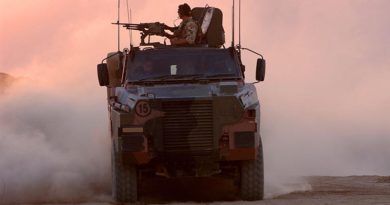Gold Card targeted in Productivity Commission report on veteran support
Share the post "Gold Card targeted in Productivity Commission report on veteran support"

The Productivity Commissions report into “A better way to Support Veterans” has been released.
FILE PHOTO: An Army Catafalque Party member rests on arms reversed as a Navy bugler salutes during an Anzac Day dawn service at Monument Hill, Fremantle, WA. ADF photo.
Among its key findings (below), is a suggestion that the Gold Card runs counter to a number of the key principles that should underlie any future veteran-support scheme.
The Commission found that the Gold Card was not wellness-focused or needs-based, and could be inefficient – encouraging over-servicing.
The Gold Card should be more tightly targeted and not be extended to any new categories of recipients, the Commission report said.
Other findings of the Productivity Commission report were pretty scathing of DVA, and recommended that a new independent statutory agency – the Veteran Services Commission (VSC) – should be established.
It also quashes an earlier suggestion that the Department of Defence should be tasked with caring for veterans – an idea the Commission recognised would not work (at this time) because of a lack of trust and confidence by veterans in Defence to exercise this policy role.
KEY POINTS:
- Despite some recent improvements to the veterans’ compensation and rehabilitation system, it is not fit for purpose — it requires fundamental reform. It is out-of-date and is not working in the best interest of veterans and their families, or the Australian community.
- In 2017-18, the Department of Veterans’ Affairs (DVA) spent $13.2 billion supporting about 166 000 veterans and 117 000 dependants (about $47 000 per client). And while the veteran support system is more generous overall than other workers’ compensation schemes, this does not mean it is an effective system.
- The system fails to focus on the lifetime wellbeing of veterans. It is overly complex (legislatively and administratively), difficult to navigate, inequitable, and it is poorly administered (which places unwarranted stress on claimants). Some supports are not wellness focused, some are not well targeted and others are archaic, dating back to the 1920s.
- The institutional and policy split between Defence and DVA also embeds perverse incentives, inefficient administration and poor accountability, and results in policy and implementation gaps.
- A future veteran support system needs to have a focus on the lifetime wellbeing of veterans. It should be redesigned based on the best practice features of contemporary workers’ compensation and social insurance schemes, while recognising the special characteristics of military service. This will change the incentives in the system so more attention is paid to the prevention of injury and illness, to rehabilitation and to transition support.
- The split in responsibility between Defence and DVA for the lifetime wellbeing of veterans also needs to be addressed. While the first best option is for responsibility for veteran policy to be transferred to the Department of Defence, given a lack of trust and confidence by veterans in Defence to exercise this policy role, and strong opposition to the change, this is not realistic or feasible at this stage.
- New governance, funding and cross agency arrangements are required to address the problems with the current system.
- A single Minister responsible for Defence Personnel and Veterans is needed to ensure policy making for serving and ex-serving personnel is integrated.
- An advisory council to the Minister should be established to provide advice on the lifetime wellbeing of veterans.
- A new independent statutory agency — the Veteran Services Commission (VSC) — should be created to administer and oversee the performance of the veteran support system.
- An annual premium to fund the expected costs of future claims should be levied on Defence.
- A ‘whole-of-life’ veteran policy under the direction of the Minister for Defence Personnel and Veterans needs to be developed by DVA, Defence and the VSC. This should include more rigorous cross-agency planning processes (including external expertise).
- Responsibility for preparing serving veterans for, and assisting them with, their transition to civilian life should be centralised in a new Joint Transition Authority within Defence.
- DVA’s Veteran Centric Reform program has some good objectives and is showing some signs of success. It should be closely monitored to ensure it is rolled out successfully and adjustments should be made, where necessary, to accommodate the proposed reforms.
- The current system should be simplified by: continuing to make it easier for clients to access; rationalising benefits; harmonising across the Acts (including a single pathway for reviews of decisions, a single test for liability and common assessment processes); and moving to two compensation and rehabilitation schemes by July 2025.
- Scheme 1 should largely cover an older cohort of veterans with operational service, based on a modified Veterans’ Entitlements Act 1986. Scheme 2 should cover all other veterans, based on a modified Military Rehabilitation and Compensation Act 2004, and over time will become the dominant scheme.
- Veterans’ organisations play an important role in the system. DVA could better leverage this support network by commissioning services from them, including for veterans’ hubs. Engaging with these organisations when there is no peak body is not easy for government. Should a national peak body be established that represents the broad interests of veterans, the Australian Government should consider funding it.
- The Gold Card runs counter to a number of the key principles that should underlie a future scheme — it is not wellness-focused or needs based. It can also be inefficient (by encouraging over-servicing). It should be more tightly targeted and not be extended to any new categories of recipients. An independent review of DVA’s fee-setting arrangements for health services is also required.
- The way treatments and supports are commissioned and provided to veterans and their families also needs to change. The VSC would more proactively engage with veterans and their families (taking a person-centred approach, tailoring treatments and supports) and have greater oversight of providers than under current arrangements. This approach will require more extensive use of data and a greater focus on outcomes.
- Expanding non-liability coverage to mental health care was a positive step. However, a new Veteran Mental Health Strategy that takes a lifetime approach is urgently needed. Suicide prevention should be a focus of the Strategy, informed by ongoing research and evaluation.
- Families of veterans have access to a number of support services provided by DVA, including access to Open Arms counselling services, respite care, and the Family Support Package. Eligibility for the Family Support Package should be extended. The VSC would have close engagement with families, providing them with more individualised support. Further research is needed to better understand the mental health impacts of service life on families and how they can be best supported.
MORE READING:
The full Productivity Commission report can be found here.
.
.
.
.
.
.

.
.
Share the post "Gold Card targeted in Productivity Commission report on veteran support"






I AM IN FURIOUS AGREEMENT. WELL SAID THAT MAN!
Re.KEY POINT 2. It highlights the ignorance of those conducting the Productivity Commission Review. Members of the ADF are not employees. They are weapons of war used at the discretion of Parliament. Unlike employees they are not protected by bans on any attacking weapons or the many carcinogenic substances used in the performance of their daily duties. Too many Veterans suffer an early death as a result of subsequent physical/mental diseases. As weapons of war fitness and good health is critical but weapons platforms, eg tanks, ships and aircraft rate higher in the need for efficiency and readiness due to their far higher strike rate capabilities and the easier replacement of individuals. Other than the fact many individuals may not be used to engage in combat, readiness of weapons platforms remain the key in peace time or war.
Readiness is the key.
If the support of Veterans is considered overly generous in comparison to employees there are very sound reasons as detailed above. Counter to that it can be said Public Servants are protected by legislation to the point of being molly coddled. Paying accident/disability insurance as part of their superannuation should be by choice.
The question that should be asked is, why do ADF members pay an insurance premium as part of their superannuation contribution when in fact any disease, injury or trauma suffered, or ongoing, as a result of Service is the SOLE responsibility of government?
I AM IN FURIOUS AGREEMENT. WELL SAID THAT MAN!